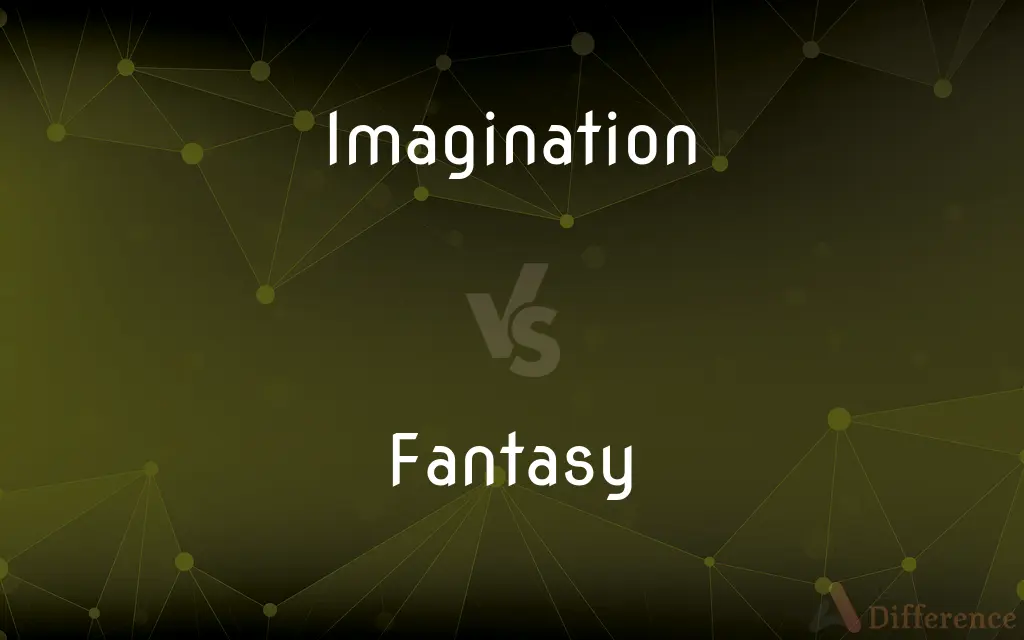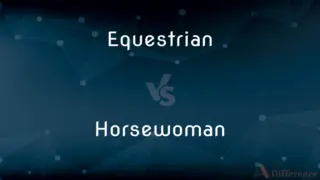Imagination vs. Fantasy — What's the Difference?
By Tayyaba Rehman — Updated on September 28, 2023
Imagination is the ability to form new ideas, images, or concepts not present to the senses, while fantasy is the product of that imagination, often involving unreal or whimsical thoughts or ideas.

Difference Between Imagination and Fantasy
Table of Contents
ADVERTISEMENT
Key Differences
Imagination and Fantasy serve as crucial components in human cognition and creativity. Imagination is a mental faculty that enables individuals to conceive of things that are not present or real. It allows one to visualize, suppose, or hypothesize scenarios, ideas, or objects that are not tangible or currently existent. It is the foundation upon which creative thoughts are built and is vital for problem-solving, artistic creation, and innovative thinking.
In contrast, fantasy refers to the creations produced by the imagination. It is often synonymous with imaginative thoughts that are unreal, whimsical, and often defy the laws of reality. Fantasy encompasses a broad spectrum, from innocent daydreams to elaborate fictional worlds with their own set of rules and characters. It is a medium through which the unreal becomes momentarily existent, allowing exploration of the impossible.
While imagination is the ability, the process of forming new concepts, ideas, or patterns without involving immediate sensory input, fantasy is the realization of this ability. Imagination lays the foundation for the creation of fantasy, enabling the conceptualization of ideas that transcend the limitations of reality. It is a catalyst that transforms abstract thoughts into vivid, often fantastical, mental images.
Fantasy, on the other hand, is the manifestation of imaginative thoughts, often characterized by supernatural themes, magical elements, and otherworldly settings. It is a gateway to uncharted territories of the mind, offering an escape from reality and a means to explore untapped realms of creativity and wonder. The enchanting worlds, extraordinary creatures, and incredible adventures typical of fantasy are the fruits borne of the seeds of imagination.
Both imagination and fantasy are integral to human creativity and the arts. Imagination fuels innovation and the formulation of unique ideas, while fantasy provides a canvas upon which these ideas can be painted, allowing them to be shared, explored, and appreciated. The synergistic relationship between imagination and fantasy enriches our understanding and perception of the world by introducing us to the endless possibilities that lie beyond the realm of the known.
ADVERTISEMENT
Comparison Chart
Definition
The ability to form new ideas or concepts not present to the senses.
The product of imagination, involving unreal or whimsical thoughts or ideas.
Nature
Process or ability.
Product or manifestation.
Relationship with Reality
Can involve both real and unreal concepts.
Typically involves unreal or supernatural elements.
Role
Lays the foundation for creative thoughts and innovation.
Provides a medium to explore and represent imaginative thoughts.
Application
Used for problem-solving, artistic creation, and innovative thinking.
Used to create fictional worlds, stories, and characters.
Compare with Definitions
Imagination
The ability to produce ideas, objects, or experiences in the mind without any immediate input of the senses.
Her vivid imagination allowed her to write extraordinary stories.
Fantasy
A mental image or series of images that are unreal or whimsical.
His latest book transports readers to a captivating fantasy world.
Imagination
A creative power of the mind to visualize things that aren’t present or real.
Albert Einstein claimed that imagination is more important than knowledge.
Fantasy
A fictional reimagining or abstraction of the real world, often in literature or media.
The fantasy novel explores themes of good versus evil in an alternate universe.
Imagination
The faculty or action of forming new ideas, concepts, or images not present to the senses.
It was his fertile imagination that conceived such innovative solutions.
Fantasy
A genre of artistic content characterized by fantastical themes and supernatural elements.
The film is a fantasy depicting a world filled with mythical creatures.
Imagination
The capacity to think creatively and produce novel ideas and solutions.
With a bit of imagination, we can find optimal solutions to these problems.
Fantasy
A creation of the imaginative faculty whether expressed or merely conceived.
The game is a blend of reality and fantasy, challenging players' perceptions.
Imagination
The mental ability to create, innovate, and visualize beyond reality.
New inventions are often the result of a vivid imagination.
Fantasy
Fantasy is a genre of speculative fiction set in a fictional universe, often inspired by real world myth and folklore. Its roots are in oral traditions, which then became fantasy literature and drama.
Imagination
Imagination is the ability to produce and simulate novel objects, sensations, and ideas in the mind without any immediate input of the senses. It is also described as the forming of experiences in one's mind, which can be re-creations of past experiences such as vivid memories with imagined changes, or they can be completely invented and possibly fantastic scenes.
Fantasy
The faculty or activity of imagining impossible or improbable things
His researches had moved into the realms of fantasy
A fantasy world
Imagination
The faculty or action of forming new ideas, or images or concepts of external objects not present to the senses
Her story captured the public's imagination
She'd never been blessed with a vivid imagination
Fantasy
A fantasia.
Imagination
The ability to form mental images of things that are not present to the senses or not considered to be real
The author uses her imagination to create a universe parallel to our own.
Fantasy
Imagine the occurrence of; fantasize about
It is ludicrous to fantasy ‘disinventing’ the hydrogen bomb
Imagination
The formation of such images
A child's imagination of monsters.
Fantasy
The creative imagination; unrestrained fancy.
Imagination
One of these mental images
"some secret sense ... which ... took to itself and treasured up ... her thoughts, her imaginations, her desires" (Virginia Woolf).
Fantasy
Something, such as an invention, that is a creation of the fancy.
Imagination
The mind viewed as the locus or repository of this ability or these images
"This story had been rattling around in my imagination for years" (Orson Scott Card).
Fantasy
A capricious or fantastic idea; a conceit.
Imagination
The ability to confront and deal with reality by using the creative power of the mind; resourcefulness
Handled the problems with great imagination.
Fantasy
A genre of fiction or other artistic work characterized by fanciful or supernatural elements.
Imagination
Attention, interest, or enthusiasm
An explorer's ordeal that caught the imagination of the public.
Fantasy
A work of this genre.
Imagination
The image-making power of the mind; the act of mentally creating or reproducing an object not previously perceived; the ability to create such images.
Imagination is one of the most advanced human faculties.
Fantasy
An imagined event or sequence of mental images, such as a daydream, usually fulfilling a wish or psychological need.
Imagination
Particularly, construction of false images; fantasizing.
You think someone's been following you? That's just your imagination.
Fantasy
An unrealistic or improbable supposition.
Imagination
Creativity; resourcefulness.
His imagination makes him a valuable team member.
Fantasy
(Music) See fantasia.
Imagination
A mental image formed by the action of the imagination as a faculty; something imagined.
Fantasy
A coin issued especially by a questionable authority and not intended for use as currency.
Imagination
The imagine-making power of the mind; the power to create or reproduce ideally an object of sense previously perceived; the power to call up mental imagines.
Our simple apprehension of corporeal objects, if present, is sense; if absent, is imagination.
Imagination is of three kinds: joined with belief of that which is to come; joined with memory of that which is past; and of things present, or as if they were present.
Fantasy
(Obsolete) A hallucination.
Imagination
The representative power; the power to reconstruct or recombine the materials furnished by direct apprehension; the complex faculty usually termed the plastic or creative power; the fancy.
The imagination of common language - the productive imagination of philosophers - is nothing but the representative process plus the process to which I would give the name of the "comparative."
The power of the mind to decompose its conceptions, and to recombine the elements of them at its pleasure, is called its faculty of imagination.
The business of conception is to present us with an exact transcript of what we have felt or perceived. But we have moreover a power of modifying our conceptions, by combining the parts of different ones together, so as to form new wholes of our creation. I shall employ the word imagination to express this power.
Fantasy
Relating to or being a game in which participants act as owners of imaginary sports teams whose personnel consists of actual players selected from a professional sports league and team performance is determined by the combined statistics of the players.
Imagination
The power to recombine the materials furnished by experience or memory, for the accomplishment of an elevated purpose; the power of conceiving and expressing the ideal.
The lunatic, the lover, and the poetAre of imagination all compact . . . The poet's eye, in a fine frenzy rolling,Doth glance from heaven to earth, from earth to heaven,And as imagination bodies forthThe forms of things unknown, the poet's penTurns them to shapes, and gives to airy nothingA local habitation and a name.
Fantasy
To imagine; visualize.
Imagination
A mental image formed by the action of the imagination as a faculty; a conception; a notion.
The same power, which we should call fancy if employed on a production of a light nature, would be dignified with the title of imagination if shown on a grander scale.
Fantasy
That which comes from one's imagination.
Imagination
The formation of a mental image of something that is not perceived as real and is not present to the senses;
Popular imagination created a world of demons
Imagination reveals what the world could be
Fantasy
(literature) The literary genre generally dealing with themes of magic and the supernatural, imaginary worlds and creatures, etc.
Imagination
The ability to form mental images of things or events;
He could still hear her in his imagination
Fantasy
A fantastical design.
Imagination
The ability to deal resourcefully with unusual problems;
A man of resource
Fantasy
(slang) The drug gamma-hydroxybutyric acid.
Fantasy
To fantasize (about).
Fantasy
(obsolete) To have a fancy for; to be pleased with; to like.
Fantasy
(transitive) To imagine; to conceive mentally.
Fantasy
Fancy; imagination; especially, a whimsical or fanciful conception; a vagary of the imagination; whim; caprice; humor.
Is not this something more than fantasy ?
A thousand fantasiesBegin to throng into my memory.
Fantasy
Fantastic designs.
Embroidered with fantasies and flourishes of gold thread.
Fantasy
To have a fancy for; to be pleased with; to like; to fancy.
Which he doth most fantasy.
Fantasy
Imagination unrestricted by reality;
A schoolgirl fantasy
Fantasy
Fiction with a large amount of fantasy in it;
She made a lot of money writing romantic fantasies
Fantasy
Something many people believe that is false;
They have the illusion that I am very wealthy
Fantasy
Imaginative invention or conjecture which may not adhere to reality.
Her fantasy involved traveling through time to witness historical events.
Common Curiosities
Can fantasy be a genre in literature?
Yes, fantasy is a prominent genre in literature, characterized by supernatural elements and magical themes.
Does imagination only involve visual sense?
No, imagination can involve all senses, allowing individuals to conceptualize sounds, tastes, textures, and smells, not just visuals.
Can imagination lead to innovation?
Yes, imagination is foundational to innovation, allowing individuals to conceive new ideas and solutions.
Can fantasy reflect deeper desires or wishes?
Yes, fantasy often reflects unfulfilled desires, aspirations, or wishes, providing an escape from reality.
Does imagination require creative thinking?
Yes, imagination is a form of creative thinking, enabling the formation of new ideas, images, or experiences.
Is fantasy harmful to reality perception?
Fantasy is not inherently harmful; however, excessive reliance on fantasy at the expense of reality can be detrimental.
Is imagination inherent or developed?
Imagination is inherent but can be developed and refined through exposure to diverse stimuli and engaging in creative activities.
Is imagination the same as fantasy?
No, imagination is the mental ability to create new ideas or concepts, whereas fantasy is the product or manifestation of imaginative thoughts, often unreal or whimsical.
Is fantasy always unreal?
Fantasy typically involves elements that are not real, often characterized by supernatural themes and whimsical ideas.
Can imagination be improved?
Yes, like other cognitive abilities, imagination can be enhanced through practice, exposure to diverse experiences, and creative pursuits.
Can fantasy influence culture?
Absolutely, fantasy can shape and reflect cultural norms, values, and expressions, influencing art, literature, and media.
Is imagination limited by knowledge?
While knowledge can inform imagination, imagination is not strictly limited by it and can extend beyond known boundaries.
Can fantasy be a form of escapism?
Yes, fantasy is often used as a form of escapism, providing a mental escape from the constraints of reality.
Can people live entirely in a world of fantasy?
While fantasy can provide a temporary escape, living entirely in a fantastical world detached from reality is not sustainable.
Can imagination solve complex problems?
Absolutely, imagination is crucial for problem-solving, allowing for the conceptualization of various solutions and approaches.
Share Your Discovery

Previous Comparison
Equestrian vs. Horsewoman
Next Comparison
Revenue vs. ProfitAuthor Spotlight
Written by
Tayyaba RehmanTayyaba Rehman is a distinguished writer, currently serving as a primary contributor to askdifference.com. As a researcher in semantics and etymology, Tayyaba's passion for the complexity of languages and their distinctions has found a perfect home on the platform. Tayyaba delves into the intricacies of language, distinguishing between commonly confused words and phrases, thereby providing clarity for readers worldwide.















































